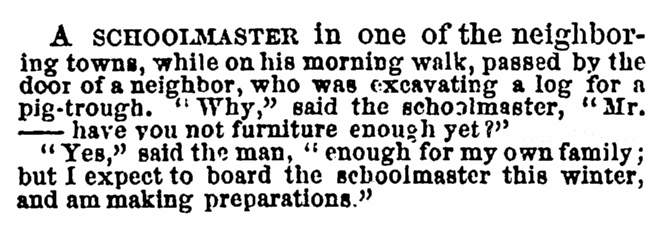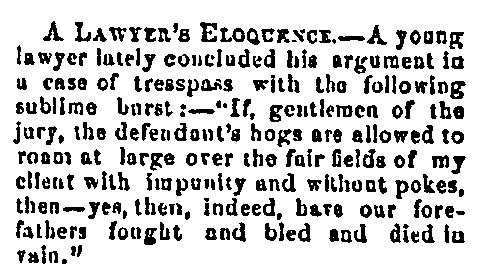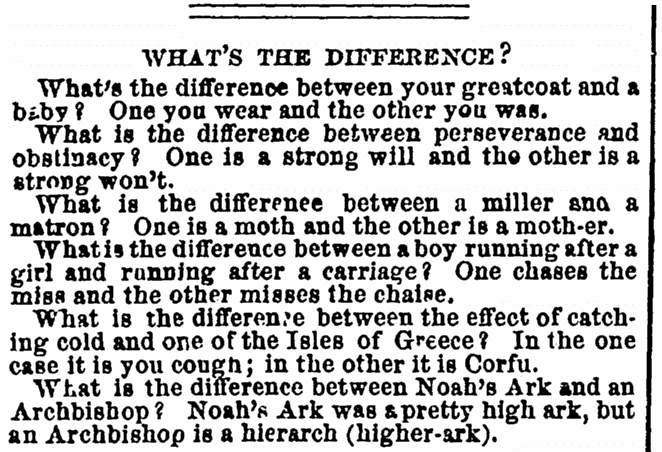Introduction: In this blog article, Mary Harrell-Sesniak shares some jokes, puns and funny stories she found while searching through newspapers from the Civil War era. Mary is a genealogist, author and editor with a strong technology background.
Even during times of strife and tragedy, people love to laugh. Laughter is, after all, the best medicine.
Rather than view this as a life anomaly, think of it as healthy escapism. It’s better to get through one’s day with laughter than with sorrow – good advice offered by this 1863 New York newspaper.

So it should not surprise you to find humor sprinkled among the columns of Civil War newspapers from 1861-1865. Despite the bloodshed and sorrow caused by the war, there was still laughter to lighten the load. Although some Civil War-era jokes are not funny by today’s standards, others are timeless. But either way, let’s take a look at some of these old jokes so that we can all laugh along with our ancestors.
Historical Perspective Needed for Some Jokes
To understand the gist of some old-time gags, such as this one from an 1862 Delaware newspaper, you’ll need a little knowledge about history: “Iron Horses” are what we now think of as steam locomotives.

Puns & Word Plays
Puns never go out of style, so perhaps you’ve heard some of these before.
- A Chicago plumbing firm advertises “lead sinks.” As if everybody didn’t know that. –Boston Traveler (Boston, Massachusetts), 15 December 1874, page 1
- What kind of gaiters should a professor wear? Investi-gators! –Plain Dealer (Cleveland, Ohio), 29 April 1861, page 4
- What part of a fish weighs the most? The scales. –Springfield Republican (Springfield, Massachusetts), 1 January 1862, page 6
- Spare the rod, and you’ll have no fish for dinner. –New York Ledger (New York, New York), 24 January 1863, page 3

Narratives & Anecdotes
Humorous stories can be used to make strong points. One such story was used by Arthur Gilman during a lecture he gave on therapy using electricity, as reported by an 1862 Massachusetts newspaper:
In illustration of this point, he related an anecdote of an old lady in Concord who had been doctored with electricity. This agent she had tried in various ways and for a long time. In relating her experience, she concluded by saying, “Lawful sakes, I was once struck by lightning, but it didn’t do me a particle of good.”
Narratives, such as this one about a schoolmaster, illustrate life in the past. Housing the teacher was a common practice, even if some found it an inconvenience.

Attitudes of the time spread into humor – even ones about patriotism. Notice how this jokester referred to how our forefathers fought, bled and died for their country.

Some narratives, such as this one from an 1864 Pennsylvania newspaper, remind us about aspects of everyday life that have been forgotten. For example, it wasn’t that long ago that the ringing of church bells throughout the day, for various reasons, was a common practice.
A drunken fellow got out of his calculation, and was dozing in the street, when the bells roused him by their ringing for fire. “Nine, ten, eleven, twelve, thirteen, fourteen,” cried he; “well, if this isn’t later than I ever knew it!”
“What is the difference?” Jokes
A favorite and timeless joke style, starting with “What is the difference,” is much like jokes told today – the only difference being that many of these illustrate long-forgotten parallels.
- What is the difference between the Prince of Wales and water from a fountain? The one is heir to the throne, and the other is thrown to the air. –Springfield Republican (Springfield, Massachusetts), 17 January 1863, page 2
- What is the difference between a bedbug and a man sleeping with snakes under his bed? One creeps over the sleepers and the other sleeps over the creepers. –Easton Gazette (Easton, Maryland), 9 January 1864, page 1
- What is the difference between the influenza and a church organist? One stops the nose and the other knows the stop. –Easton Gazette (Easton, Maryland), 9 January 1864, page 1

War and Peace Quips
I’ll finish this blog article with jokes on war and peace. As could be expected, opposing sides took punches at each other during the war. Many of these jokes open old wounds, so – with the goal of not taking sides – I’ve chosen to eliminate all those that flog and put down specific opponents.

- There are pretended patriots who will hold anything except their tongues; keep anything except their word; and lose nothing patiently except their character. –New York Ledger (New York, New York), 24 January 1863, page 3
- They say that too many minors are enlisted in our army, but Vanity Fair thinks that the minors do a great deal better than some of the majors. –Springfield Republican (Springfield, Massachusetts), 3 January 1863, page 7
- “I’ll die for the flag,” cried a treasury clerk; Quoth a soldier, “My patriot friend, look-a-here. This shedding your blood for twelve dollars a-month. Ain’t like shedding red ink for twelve hundred a-year.” –Springfield Republican (Springfield, Massachusetts), 1 February 1862, page 6

Hope you’ve enjoyed these jokes our ancestors may have enjoyed during the hardships of the Civil War!
Note: an online collection of newspapers, such as GenealogyBank’s Historical Newspaper Archives, is not only a great way to learn about the lives of your ancestors – the old newspaper articles also help you understand American history and the times your ancestors lived in, and the news they talked about and read in their local papers – even the jokes they shared. Did any of your ancestors serve in the Civil War? Please share your stories with us in the comments.
Related Civil War Articles:
- Using Historical Newspapers to Research My Civil War Ancestry
- The ‘Confederate Column’ – a Times-Picayune Newspaper Feature
- Civil War Newspaper Research: Personal Notices & Letters
- Civil War Genealogy: Old Letters in Newspapers & Research Resources
- A Confederate Soldier Writes Home

I am trying to find the joke I heard about a tour guide giving a tour of civil war sites. My memory is: “At each battle site he would conclude the Confederates had decisively beat the Yankees. At one point a Northerner interrupted the tour guide to point out he was a history professor and in fact the Northern Army had defeated the Confederates at this and other prior site visits. The tour guide responded, I am giving this tour and on my tour the South will always win.” I would like the more elegant words of the joke by the tour guide to use in the context of today’s culture of alternative facts.
Can you help me locate other versions?
Dan,
Thank you for writing. I am not familiar with that joke, although I think there was a board game in which you could manipulate battles so that the either side won.
Mary